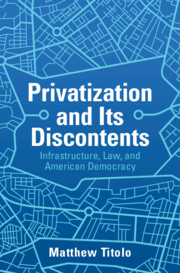Book contents
- Privatization and Its Discontents
- Privatization and Its Discontents
- Copyright page
- Dedication
- Contents
- Acknowledgments
- Introduction
- 1 Early Liberalism, Adam Smith, and the Seeds of the Infrastructural State
- 2 Forging the Infrastructural State
- 3 “A Wilderness of Turnpike Gates”
- 4 The Panic of 1837 and the Infrastructure Crash
- 5 “The Ground under Our Feet”
- 6 The Death of Laissez-Faire and the Rise of Infrastructure in the Cold War
- Conclusion
- Index
3 - “A Wilderness of Turnpike Gates”
Roads and Public Authority in Antebellum America
Published online by Cambridge University Press: 08 June 2023
- Privatization and Its Discontents
- Privatization and Its Discontents
- Copyright page
- Dedication
- Contents
- Acknowledgments
- Introduction
- 1 Early Liberalism, Adam Smith, and the Seeds of the Infrastructural State
- 2 Forging the Infrastructural State
- 3 “A Wilderness of Turnpike Gates”
- 4 The Panic of 1837 and the Infrastructure Crash
- 5 “The Ground under Our Feet”
- 6 The Death of Laissez-Faire and the Rise of Infrastructure in the Cold War
- Conclusion
- Index
Summary
During the privatization craze of the 1980s, libertarians advocated toll roads as the cure for America’s “crumbling infrastructure” problem. As Gerald Gunderson writes in “Privatization and the 19th-Century Turnpike,” Americans invented an “ingenious” market mechanism for supplying its road deficit: the public–private partnership. However, as libertarian commentator Timothy B. Lee concedes: “Roads are deeply intertwined with governments. They always have been and as far as I can see they always will be. This means that theyll never be truly private in the sense that other private companies like restaurants or shoe factories can be.” Chapter 3 illustrates Lee’s insight and argues that highways and roads were a defining feature of “publicness” in the American antebellum experience. Although turnpikes were organized as private businesses and charged tolls in order to recoup considerable investment and turn a profit, in the end they could really not be operated as private businesses: they were inherently political undertakings that required the participation of legislatures, courts, investors, and the general public. Moreover, turnpikes were built in a field of political contestation in which Americans often resisted the privatization of customary public spaces.
Keywords
- Type
- Chapter
- Information
- Privatization and Its DiscontentsInfrastructure, Law, and American Democracy, pp. 87 - 110Publisher: Cambridge University PressPrint publication year: 2023



